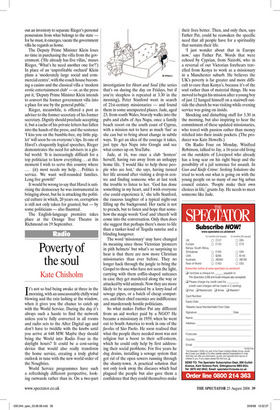Poverty of the soul
Kate Chisholm
It’s not so bad being awake at three in the morning, with an unseasonably chilly wind blowing and the rain lashing at the window, when it gives you the chance to catch up with the World Service. During the day it’s always such a hassle to find the network unless you’re fully converted in all rooms and radio sets to the After Digital age and don’t have to twiddle with the knobs until you arrive at 648 MW. Maybe they should bring the World into Radio Four in the daylight hours? It could be a cost-saving device that would also really transform the home service, creating a truly global outlook in tune with the new world order of the Noughties.
World Service programmes have such a refreshingly different perspective, looking outwards rather than in. On a two-part investigation for Heart and Soul (the series that’s on during the day on Fridays, but if you’re sleepless is repeated at 3.30 in the morning), Peter Stanford went in search of 21st-century missionaries — and found them in some unexpected places. Jade, aged 23, from south Wales, bravely walks into the pubs and clubs of Aya Napa, once a family beach resort on the south coast of Cyprus, with a mission not to have as much ‘fun’ as she can but to bring about change in subtle ways. To get an idea of the courage it takes, just type Aya Napa into Google and see what comes up on YouTube.
Jade, at 16, was once a club ‘hostess’ herself, having run away from an unhappy home life. ‘I would like to help those people who are lost,’ she says, having turned her life around after visiting a drop-in centre and finding someone who at last took the trouble to listen to her. ‘God has done something in my heart, and I wish everyone else could experience it,’ she tells Stanford, the raucous laughter of a typical night-out filling up the background. Her tactic is not to preach, but to listen and hope that somehow the magic words ‘God’ and ‘church’ will come into the conversation. Only then does she suggest that perhaps there’s more to life than a tanker-load of Tequila sunrise and a blinding hangover.
The word ‘missionary’ may have changed its meaning since those Victorian ‘pioneers in pith helmets’ but what’s so surprising to hear is that there are now more Christian missionaries than ever before. They no longer hack through the jungle to bring the Gospel to those who have not seen the light, carrying with them coffin-shaped suitcases in case they get murdered along the way or attacked by wild animals. Now they are more likely to be accompanied by a lorry-load of sewage pipes, or a batch of cheap computers, and their chief enemies are indifference and murderously hostile politicians.
So what makes Father Pat any different from an aid worker paid by a NGO? He became a missionary in 1959, when he went out to South America to work in one of the favelas of São Paolo. He soon realised that what the people there needed most was not religion but a boost to their self-esteem, which he could only help by first addressing their social problems. For five years he dug drains, installing a sewage system that got rid of the open sewers running through the shanty-town. A practical solution that not only took away the diseases which had plagued the people but also gave them a confidence that they could themselves make their lives better. Then, and only then, says Father Pat, could he reawaken the specific need that all people have for a spirituality that sustains their life.
‘I just wonder about that in Europe now,’ says Father Pat. Words that were echoed by Cyprian, from Nairobi, who in a reversal of our Victorian forebears travelled from Kenya to work as a missionary in a Manchester suburb. He believes the UK’s poverty is far greater and more difficult to cure than Kenya’s, because it’s of the soul rather than of material things. He was moved to begin his mission after a young boy of just 12 hanged himself on a stairwell outside the church he was visiting while evening service was going on inside.
Shocking and disturbing stuff for 3.30 in the morning, but also inspiring to hear the commitment of these updated missionaries, who travel with passion rather than money stitched into their inside pockets. (The producer was Kate Howells.) On Radio Four on Monday, Winifred Robinson, talked to Jay, a 16-year-old living on the outskirts of Liverpool who already has a long scar on his right bicep and the possibility of a jail sentence for assault. In Gun and Knife Crime: Seeking Solutions she tried to work out what is going on with the young people on so many of our big urban council estates. ‘People make their own choices in life,’ grunts Jay. He needs to meet someone like Jade.


























































 Previous page
Previous page